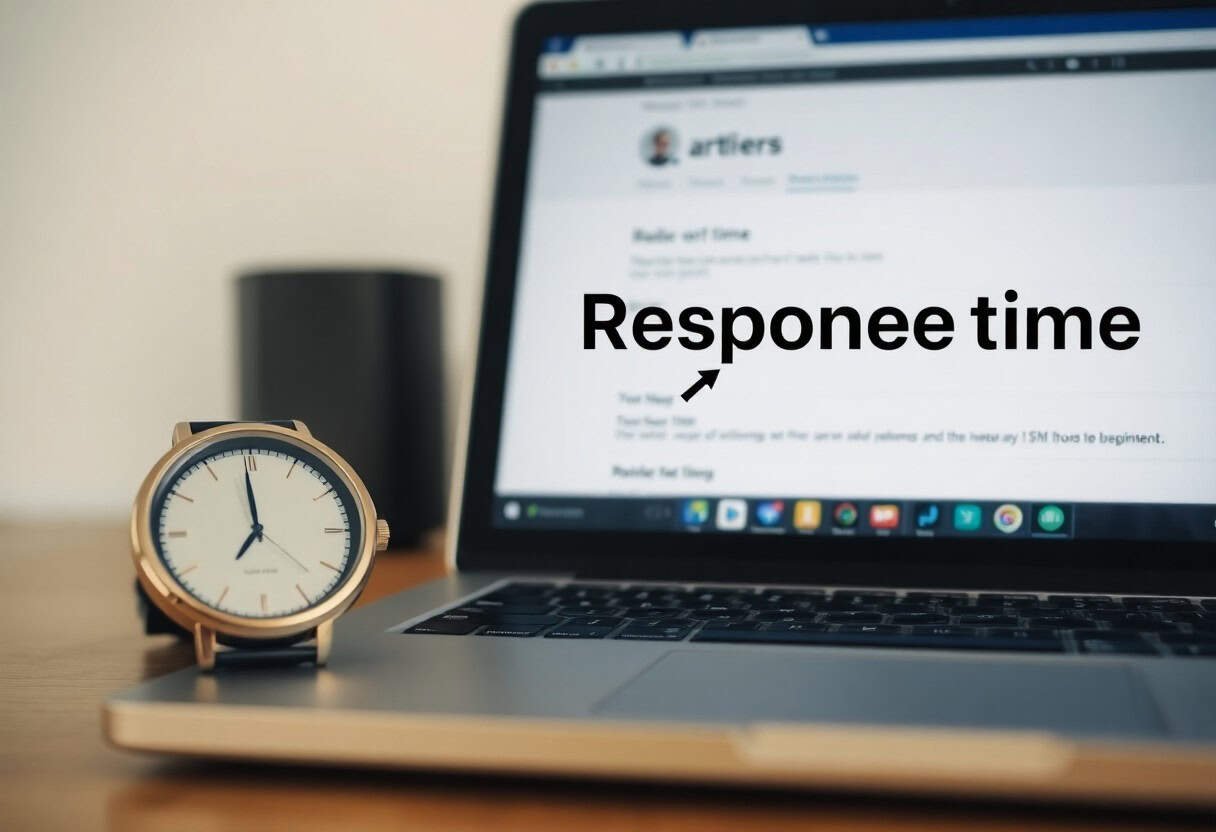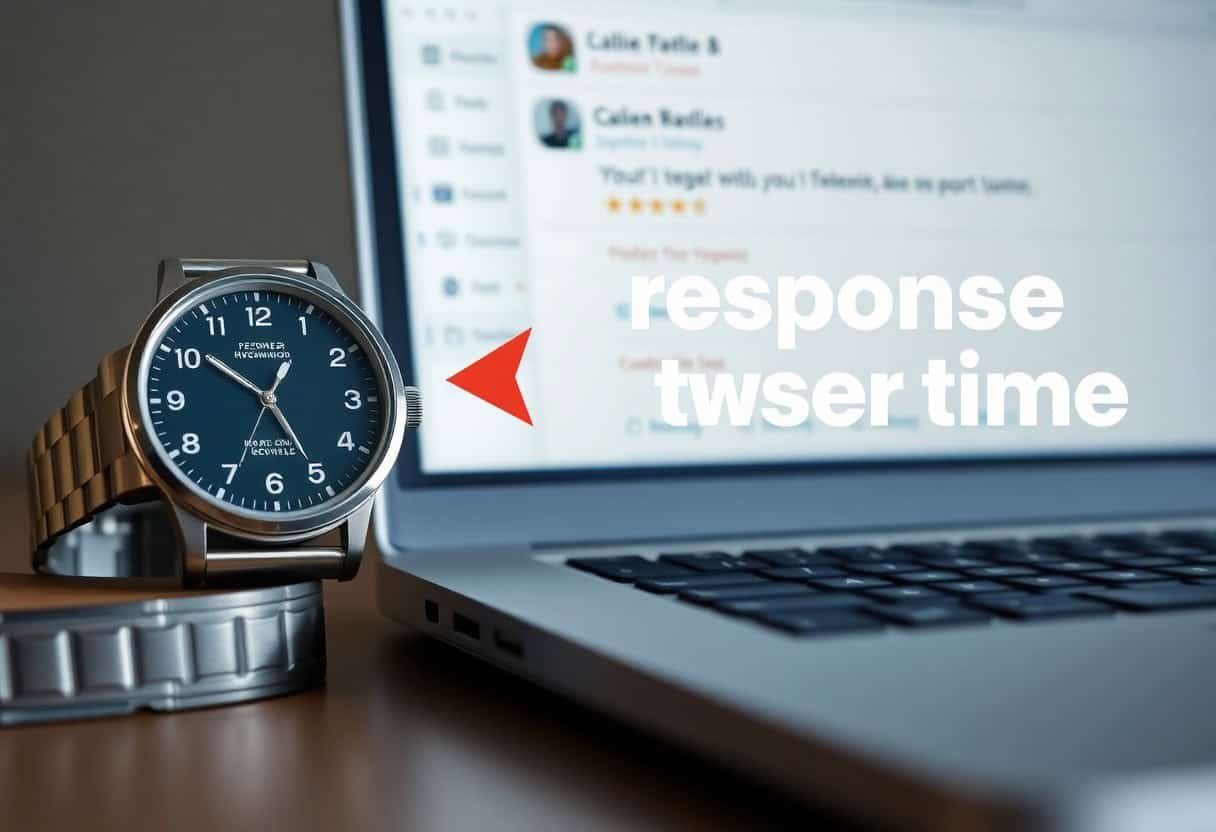Response time to customer reviews can significantly influence your search engine rankings and online reputation. By engaging promptly with feedback, you demonstrate commitment to customer satisfaction, which can enhance your business’s credibility. Search algorithms often consider user engagement metrics, meaning faster responses might lead to improved visibility in search results. Understanding this relationship can help you implement effective strategies for managing reviews and optimizing your online presence.
Key Takeaways:
- Faster response times can improve customer satisfaction and increase the likelihood of positive reviews.
- Search engines may factor in engagement metrics, which can indirectly influence rankings.
- Consistent and timely responses demonstrate business reliability, potentially attracting more customers.

The Tangible Impact of Review Response Time on Rankings
Engaging promptly with customer reviews not only enhances user experience but also carries measurable effects on your rankings. Search engines like Google place a high value on responsiveness, interpreting it as a sign of an active and attentive business. Fast response times not only signal to customers that you care but also may influence your positioning in local search results. Therefore, making a habit of addressing reviews quickly can yield notable benefits for your online visibility.
How Search Engines Evaluate Engagement Signals
Search engines assess various engagement signals, including response times to reviews, to determine the credibility and relevance of your business. Rapid replies can indicate a commitment to customer satisfaction, leading algorithms to favor your establishment in search rankings. Engagement metrics such as response frequency and review volume also factor into how search engines view your authority in a given market, shaping potential visibility in search results.
The Correlation Between Engagement and Search Visibility
Engagement directly correlates with your search visibility, creating a dynamic relationship that influences how potential customers discover you. Businesses that actively respond to reviews experience increased user interaction, which can enhance their ranking factors. Frequent engagement with customers generates more interactions that search algorithms recognize, amplifying your online presence and potentially improving your position in search results.
Data from various studies indicates that businesses responding to reviews can see a 5-10% increase in search rankings. For instance, a study by Moz found that response rates to reviews can impact local search visibility significantly. When you engage with your customers through timely review responses, you not only maintain a good reputation but also foster more interaction, which search engines reward. Proactively managing your customer feedback, therefore, becomes a strategic advantage that can lead to a stronger digital footprint.

Psychological Factors: Customer Perception and Behavior
Customer perception can sway purchasing decisions immensely. Rapid review responses signal to potential buyers that you value their input, fostering trust. Key influences include:
- Perceived engagement levels
- Brand reputation enhancement
- Increased likelihood of repeat business
Assume that each interaction shapes your brand’s image and affects customer loyalty.
The Trust Effect: Faster Responses Build Credibility
Swift responses to reviews bolster your credibility. Customers are more inclined to trust businesses that acknowledge feedback quickly. A 2015 study showed that 75% of consumers expect brands to respond to negative reviews within 24 hours. When you demonstrate attentiveness, it enhances your reputation, making customers feel heard and valued.
The Role of Review Responses in Customer Decision-Making
Review responses play a pivotal role in shaping customer decisions. Potential customers often scrutinize how you handle feedback before choosing your services. A well-crafted response to a negative review can sway opinions and may turn a hesitant buyer into a loyal one. The more you engage positively, the stronger your influence over future purchases becomes.
For example, consider a scenario where a restaurant receives a negative review about wait times. If the owner responds promptly, acknowledging the issue and offering a solution, that transparency can resonate with prospective diners. They may view the restaurant as approachable and dedicated to improvement, leading to a higher likelihood of dining there despite past complaints. This illustrates how your responses can carve a path to increased customer acquisition and loyalty.
Best Practices for Timely and Effective Review Responses
Implementing best practices for review responses can significantly enhance your engagement with customers. Timely replies not only show dedication but can also improve your overall reputation. Establish a routine for monitoring reviews, prioritizing responses based on urgency, and creating a system that ensures no feedback goes unnoticed. Balancing speed with quality is imperative; cultivate a consistent voice that aligns with your brand while addressing concerns and appreciating positive feedback.
Setting Realistic Response Time Goals
Your response time goals should reflect your operational capacity. If your average response time is over 72 hours, aim to shorten it gradually. Start by committing to respond within 48 hours for low-priority reviews, while reserving immediate attention for urgent ones. Tracking your progress over time allows you to refine these goals further and foster a pro-customer reputation.
Crafting Responses that Foster Engagement
Engaging responses can significantly enhance your relationship with customers. A well-crafted reply demonstrates that you value their input, regardless of whether their feedback is positive or negative. Personalizing responses by using the reviewer’s name or referring to specific issues mentioned encourages further interaction and shows authenticity.
To foster engagement effectively, personalize your responses with specific details from the customer’s review. Acknowledge their experiences and emotions, which can create an emotional connection. For example, if a customer mentions a product that exceeded their expectations, take the opportunity to thank them for their insights and invite them to share more about their experience with similar products. This not only promotes loyalty but also encourages others to contribute, enriching your community and improving your brand image.
Competitive Analysis: Staying Ahead of the Curve
Understanding your competitors’ strategies can provide valuable insights into how to optimize your review response time. Analyzing their engagement tactics reveals trends and benchmarks that you can adopt. By staying informed on their response rates and popular strategies, you can refine your approach, ensuring that your business stands out in the crowded marketplace. Comparing your metrics with competitors helps identify potential gaps and areas for improvement, keeping you at the forefront of customer engagement.
How Competitors are Leveraging Response Time
Many competitors are prioritizing rapid response times to enhance customer loyalty and boost their online reputation. Companies that effectively respond to reviews often showcase their commitment to customer service, fostering positive perceptions. Your competitors may utilize automated response systems during peak times to ensure timely engagement, translating to higher customer satisfaction and improved rankings.
Tools and Technologies to Streamline Review Management
Utilizing technology is a game-changer in optimizing review response time. Platforms like ReviewTrackers, Podium, and Birdeye offer integrated solutions that help you monitor, manage, and respond to reviews efficiently. These tools provide analytics to track your performance relative to competitors, assisting in identifying what strategies yield the best results.
Several tools enhance your review management by offering features like automated responses, real-time notifications, and detailed analytics. For instance, ReviewTrackers allows you to set up alerts for new reviews, ensuring you never miss an opportunity to engage. Additionally, automation can help craft quick responses that still feel personalized. By consolidating multiple review platforms into one interface, you can manage your online reputation more effectively and maintain a swift response time across various channels, keeping you competitive in your industry.
The Future of Review Management: Trends and Predictions
Anticipating shifts in review management practices is vital for staying ahead. With increasing reliance on customer feedback, businesses will need to enhance their responsiveness and transparency. Expect an uptick in tools that analyze sentiment beyond simple ratings, giving you deeper insights into customer feelings and preferences. This proactive approach will allow you to anticipate issues before they escalate, creating a more positive brand image and deeper customer loyalty.
Anticipating Changes in Consumer Expectations
Today’s consumers demand more than just quick responses; they seek genuine engagement and personalized interactions. Brands that can offer tailored experiences based on past reviews and feedback will resonate more effectively. As social media and online platforms evolve, you should be prepared to meet heightened customer expectations around transparency and authenticity in your responses.
Evolving Algorithms: What to Watch For
Stay vigilant with algorithm changes from major platforms that directly influence review visibility. These algorithms are adapting to prioritize authentic interactions and response times, meaning that your review strategies must align with these shifts. Engaging positively with reviews will likely enhance your overall online presence as search engines favor businesses that actively manage their reputations.
The rise of AI in search and review algorithms is shaping future strategies. Major platforms are fine-tuning their algorithms to weigh factors such as the sentiment of your responses and the frequency of engagement. For example, Google has recently emphasized the importance of encouraging user-generated content alongside your reviews. Therefore, adopting a proactive approach in responding can improve your visibility. Ensuring timely, heartfelt, and authentic responses could lead to better rankings, as algorithms increasingly recognize genuine engagement as a marker of quality service.
Final Words
With these considerations, you can see that your review response time does influence your rankings. By promptly addressing customer feedback, you demonstrate engagement and reliability, which positively impacts your business’s online visibility. Ensuring timely responses not only fosters customer loyalty but also signals to search engines that your business is active and trustworthy. Therefore, prioritizing review responses can enhance your overall performance in search engine results, bolstering your brand’s reputation and discoverability.
FAQ
Q: Does review response time influence my rankings on platforms?
A: Yes, response time can influence rankings. Platforms often reward businesses that engage with customers promptly, which may enhance visibility and credibility.
Q: How can faster response times positively impact my business?
A: Faster response times can lead to higher customer satisfaction. Satisfied customers are more likely to leave positive reviews, which can improve overall rankings and attract new customers.
Q: What strategies can I implement to improve my review response time?
A: Consider setting up notifications for new reviews, designating team members for review management, and using templates for quick responses. These practices can streamline the process and enhance responsiveness.

